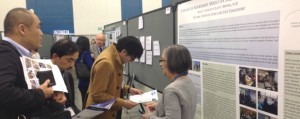 The American Association for the Advancement of Science (AAAS) held its annual meeting in San Jose, CA on February 12th-16th. This meeting is one of the most widely recognized global science gatherings, which hosts sessions that cover a broad range of topics, including STEM education reform, civic engagement, and science communication—topics threaded throughout the SENCER Ideals and practice.
The American Association for the Advancement of Science (AAAS) held its annual meeting in San Jose, CA on February 12th-16th. This meeting is one of the most widely recognized global science gatherings, which hosts sessions that cover a broad range of topics, including STEM education reform, civic engagement, and science communication—topics threaded throughout the SENCER Ideals and practice.
Many of these themes were also mirrored in the inaugural Citizen Science Association meeting, which took place in partnership with AAAS on February 11th and 12th in San Jose. A range of individuals participated, representing science and natural history museums, community groups, journalists, and education institutions at all levels. The keynote address looked at the interplay between science and society and the importance of public participation in the process of science.
The importance of civic engagement around the study and understanding of important civic issues is a central theme in the citizen science activities that were presented. Presentations focused on a wide range of citizen involvement in scientific inquiry, including reporting on the flu, collecting specimens in national parks, measuring rainfall, monitoring air pollution, rare plants, and water quality, surveying seabirds, and a many other activities. Other presentations addressed the assessment of citizen science programs and ensuring the quality of data collected. Though the work of citizens of all ages was presented, the meeting had an emphasis on engaging young learners in these types of activities that spark their interest in science.
SENCER was represented throughout the meetings, with SENCER-ISE project director Ellen Mappen and coordinator Hailey Chenevert attending the meetings to learn from and connect with informal and formal science educators, and spread the word about the SENCER-ISE project. Their main opportunity for dissemination came during their presentation at the February 14th AAAS poster session. With a lively Family Science Day taking place just a few feet away, the SENCER-ISE poster received a lot of attention from very interested attendees looking to learn more about the project, as well as SENCER and the National Center for Science and Civic Engagement.
SENCER and its supporters were also represented at session presentations during the AAAS meeting.
Cathy Middlecamp, SENCER Co-PI at the University of Wisconsin-Madison, and Jessica Wyndham, a past NCSCE DC Symposium plenary speaker at AAAS, hosted a career pathways workshop called “Integrating Human Rights into Your STEM Training.” During the workshop, Wyndham addressed numerous connections between science and human rights, such as the right to housing, health, and the benefit of scientific advances. Wyndham emphasized that many disciplines relate to human rights work. Middlecamp added that educators need to “reposition themselves from the center of their disciplines into the real world in order to engage students in learning about issues of social justice.” Continue reading to learn more about Wyndham’s plenary address at the 2014 DC Symposium, and for more human rights resources written by Wyndham and others.
Myles Boylan, the National Science Foundation program director for SENCER, presented on a panel focusing on graduate STEM education. During the session, “Graduate Science Education in Flux: Alternate Pathways to Science Careers,” Boylan spoke of the current opportunities and challenges we are facing in graduate education. While he noted that we are not in a “crisis situation” and that graduates are still valued for their problem solving skills, he discussed a “growing inefficiency” that is coming from not meeting employer needs. He offered information from a number of studies that call for new approaches, such as providing practical application of formal studies, moving away from an “apprentice” model to one that produces independent and engaged students, and including non-science subjects–economics, for example–in chemistry studies. He also provided information about a new program, the NSF Research Traineeship (NRT) Program, which focuses on improving graduate education by developing skills, knowledge, and competencies needed to pursue a range of STEM careers.
To learn more about the STEM education work done by SENCER and SENCER-ISE, visit our project websites.
